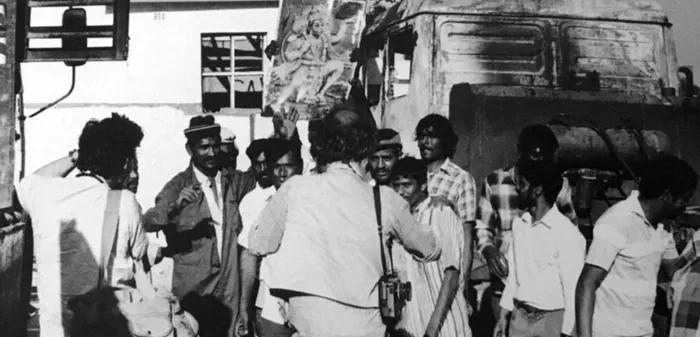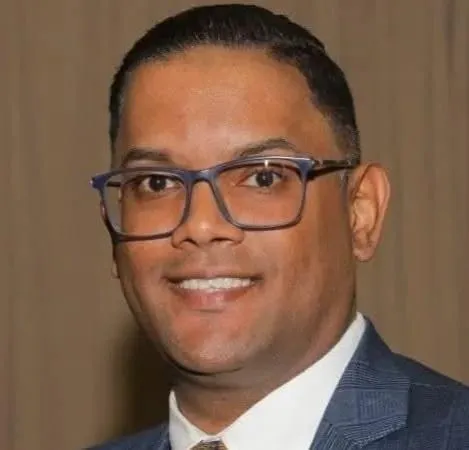Forty years on: remembering the 1985 Inanda riots and the unhealed wounds of our province
A call for justice and reconciliation

Indian protestors gather to protect properties during the Inanda Riots.
Image: Omar Badsha
AUGUST marks 40 years since the dreadful 1985 Inanda riots, a tragic episode in KwaZulu-Natal’s history that left an indelible scar on our collective conscience.
What began as political and social tensions ignited into a blaze of violence that claimed three lives, displaced more than 1 500 members of the Indian community, and destroyed homes, possessions, and precious family heirlooms accumulated over generations.
The horror of those days is still etched in the memories of survivors. Families fled their burning homes in the dead of night, children clung to their parents in terror, and communities that had once co-existed in uneasy proximity suddenly found themselves torn apart by suspicion, anger, and mistrust. The riots were not only an eruption of violence but also an unmasking of the fragile inter-racial relations of the time, which apartheid social engineering had so deeply manipulated.
Yet, despite the magnitude of these events, 40 years later, justice remains elusive.
The truth behind the causes of the riots has never been formally identified. No independent or impartial commission of inquiry was ever convened to interrogate the events and their root causes. No comprehensive report has been tabled in Parliament. No reparations have been offered to families who lost everything. Instead, survivors have had to live with the trauma, rebuild their lives in silence, and bear the burden of a society that has preferred to forget rather than confront.
This failure of justice demands our attention and compels us, even now, to ask: what can and should be done to heal these wounds, restore dignity to the victims, and strengthen social cohesion in our province?
The Inanda riots were not an isolated eruption of violence. They were the consequence of apartheid’s deliberate social engineering, which placed African, Indian, and coloured communities in competition for resources, land, and opportunities, while entrenching white privilege. That bitter legacy framed the hostilities that erupted in 1985, and the absence of truth and reconciliation thereafter has deepened divisions rather than healed them.
For those directly affected, the riots inflicted deep psychological wounds. Survivors still recall the fear of displacement, the humiliation of losing homes and possessions, and the trauma of becoming refugees in their own country. Children who witnessed the violence grew up with fractured identities and a lingering sense of insecurity. Some developed generational trauma that continues to shape family life today.
Entire livelihoods were destroyed overnight. Businesses that had taken decades to build were razed. Households lost not only homes but also the savings and assets that represented their life’s work. Many families had no insurance or financial safety nets, forcing them into cycles of poverty from which they never fully recovered. The ripple effects of that economic devastation are still felt today in households that have struggled to regain stability.
Perhaps the most damaging legacy of the riots is the widening of the racial divide in KwaZulu-Natal. Suspicion, mistrust, and prejudice deepened between African and Indian communities, laying a foundation for later conflicts, including the tragic events of July 2021. The riots entrenched a narrative of division that persists in some quarters today, fuelling resentment and undermining social cohesion. It is sometimes said that forty years is too long to demand justice.
That argument fails to recognise that justice is not bound by time. The wounds of the Inanda riots remain open because they were never acknowledged, never interrogated, and never redressed. For survivors, justice is not merely about compensation but about recognition - recognition that their suffering mattered, that their lives were disrupted unjustly, and that the state has a moral duty to make amends.
South Africa cannot claim to be a society committed to reconciliation and justice if entire communities who were victims of violence are left without redress. The failure to act has reinforced the perception that the lives and suffering of minority groups are expendable, a dangerous perception in a democracy that aspires to equality. If we are serious about building a just and cohesive society, then remedial action must be taken.
The following steps are critical:
1. A Commission of Inquiry: Government must establish an independent commission of inquiry into the 1985 Inanda riots. The purpose of this commission should be:
- To uncover the true causes of the violence.
- To determine whether there was any orchestration or negligence by the state or political actors.
- To provide a platform for survivors to share their experiences.
- To make recommendations for compensation, reparations, and reconciliation.
- Such a commission would not only provide truth but also validate the pain of survivors who have waited decades to be heard.
2. Compensation and reparations: Families who lost homes, businesses, and possessions must be compensated. Reparations could take the form of financial compensation, housing support, educational bursaries for descendants, and targeted economic opportunities. This would not erase the pain but would help restore dignity and repair some of the economic harm caused.
3. Psychosocial support: Counselling and trauma support must be extended to surviving victims and their descendants. Trauma does not dissipate with time; it lingers across generations. A programme of community-based psychosocial support could help address the psychological scars of the riots.
4. Memorialisation: The Inanda riots must be formally recognised in our history. A memorial site, museum, or annual day of remembrance should be established to ensure that the events are not forgotten. This would also serve as a reminder of the dangers of racial division and the need to foster unity.
5. Strengthening social cohesion: The riots highlighted the dangers of racial polarisation. Today, forty years later, we must work deliberately to strengthen relations between communities. Programmes that foster dialogue, economic cooperation, and shared community projects between African and Indian communities in KwaZulu-Natal are essential.
The Inanda riots serve as a warning of what can happen when inequality, racial division, and social tension are left unchecked. Sadly, the echoes of 1985 could be heard again in the violence of July 2021, when communities turned on one another in an explosion of anger and desperation. We cannot afford to repeat this cycle.
We must break it by addressing historical injustices and building a society based on equity, justice, and mutual respect. Confronting the past honestly is not about reopening wounds; it is about ensuring that those wounds are properly healed. Forty years have passed since the Inanda riots, but for survivors and their families, the pain remains as real as it was in 1985.
Justice delayed has been justice denied. Yet, it is not too late. The state can and must act - through a commission of inquiry, compensation, psychosocial support, memorialisation, and deliberate efforts to foster unity across communities. As a province and as a nation, we owe it to those who lost their lives, their homes, and their livelihoods to confront this painful chapter honestly and courageously.
To remain silent, to fail to act, is to betray the very principles of justice and reconciliation on which our democracy was founded. The Inanda riots are not just a part of Indian history or African history. They are South African history. Their lessons must guide us if we are to prevent future tragedies and build a society in which every community feels recognised, valued, and protected.
Forty years on, we cannot undo the past. But we can choose to honour it by pursuing truth, justice, and reconciliation. That is the least we owe to the victims - and to the generations yet to come.

Dr Jonathan Annipen
Image: File
Dr Jonathan Annipen, IFP Councillor in eThekwini, Whip of the IFP (Finance). The column is written in his personal capacity.
** The views expressed do not necessarily reflect the views of IOL or Independent Media.
THE POST https://thepost.co.za/
Related Topics: